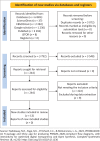Healthcare practitioners and students' PEP knowledge, attitude and adherence in Southern Africa
- PMID: 36483500
- PMCID: PMC9724098
- DOI: 10.4102/hsag.v27i0.2036
Healthcare practitioners and students' PEP knowledge, attitude and adherence in Southern Africa
Abstract
Background: There is a high prevalence of occupational exposure among health care practitioners (HCPs) around the globe. One of the risk factors of HIV infection among HCPs is occupational exposure to human immunodeficiency virus (HIV) infection through blood or fluid from HIV-infected individual. Therefore, because of this prevalence, there is a need to have sufficient knowledge and information regarding post-exposure prophylaxis (PEP). Sufficient PEP knowledge assists individuals in utilising PEP in case of exposure to HIV.
Aim: This study aims to assess the level of knowledge, attitude and adherence to PEP in HCPs in Southern Africa.
Setting: The systematic review included studies conducted in Southern Africa.
Methods: A systematic review was conducted. Search engines employed in this study included Google Scholar, Science Direct, PubMed, Ebscohost and JSTOR. From these, 3572 articles emerged after removing duplications, and article screening was guided by inclusion and exclusion criteria and outlined on a PRISMA flow chart. Ultimately, the study included 13 articles. A critical appraisal skills programme was applied for the quality assessment of the eligible studies.
Results: Studies included in this review revealed that most participants have adequate knowledge regarding PEP (n = 6). However, it was revealed that poor adherence occured because most HCPs did not complete PEP.
Conclusion: Health care practitioners have adequate knowledge of PEP with varying levels of adherence to PEP. Therefore, more awareness illustrating the importance of adhering to PEP is needed.
Contribution: There is an adequate level of knowledge regarding PEP found in the included studies although not satisfactory in Southern Africa given the participants are HCPs, and marked inappropriate practices affect adherence.
Keywords: Southern Africa; adherence; attitudes; health care practitioners; knowledge; students.
© 2022. The Authors.
Conflict of interest statement
The author(s) declare that they have no financial or personal relationship(s) that may have inappropriately influenced them in writing this article.
Similar articles
-
Knowledge, attitude and practices of medical and health science students on the antiretroviral based HIV post-exposure prophylaxis in an Ethiopian hospital: an institutional based cross-sectional study.BMC Health Serv Res. 2019 Oct 21;19(1):713. doi: 10.1186/s12913-019-4611-2. BMC Health Serv Res. 2019. PMID: 31638985 Free PMC article.
-
Knowledge and attitudes of non-occupational HIV post-exposure prophylaxis amongst first- and second-year medical students at Stellenbosch University in South Africa.Afr J Prim Health Care Fam Med. 2014 Nov 24;6(1):E1-9. doi: 10.4102/phcfm.v6i1.665. Afr J Prim Health Care Fam Med. 2014. PMID: 26245421 Free PMC article.
-
Assessment of knowledge, attitudes and practices of HIV post exposure prophylaxis among the doctors and nurses in Princess Marina Hospital, Gaborone: a cross-sectional study.Pan Afr Med J. 2018 Jul 27;30:233. doi: 10.11604/pamj.2018.30.233.10556. eCollection 2018. Pan Afr Med J. 2018. PMID: 30574252 Free PMC article.
-
The State of Affairs in Post-Exposure Leprosy Prevention: A Descriptive Meta-Analysis on Immuno- and Chemo-Prophylaxis.Res Rep Trop Med. 2020 Oct 15;11:97-117. doi: 10.2147/RRTM.S190300. eCollection 2020. Res Rep Trop Med. 2020. PMID: 33117053 Free PMC article. Review.
-
Evidence-informed practice versus evidence-based practice educational interventions for improving knowledge, attitudes, understanding, and behavior toward the application of evidence into practice: A comprehensive systematic review of UG student.Campbell Syst Rev. 2022 Apr 16;18(2):e1233. doi: 10.1002/cl2.1233. eCollection 2022 Jun. Campbell Syst Rev. 2022. PMID: 36911346 Free PMC article. Review.
Cited by
-
Midwives' compliance with post-exposure prophylaxis guidelines in Tshwane District, South Africa.Curationis. 2024 Sep 11;47(1):e1-e12. doi: 10.4102/curationis.v47i1.2548. Curationis. 2024. PMID: 39354779 Free PMC article.
-
Knowledge, attitude, and practice of human immune-deficiency virus (HIV) post-exposure prophylaxis among healthcare workers of governmental hospitals in Addis Ababa, Ethiopia.Infect Prev Pract. 2023 Feb 6;5(2):100270. doi: 10.1016/j.infpip.2023.100270. eCollection 2023 Jun. Infect Prev Pract. 2023. PMID: 36910423 Free PMC article.
-
Updated guidelines on HIV post-exposure prophylaxis: continued efforts towards increased accessibility.J Int AIDS Soc. 2024 Nov;27(11):e26393. doi: 10.1002/jia2.26393. J Int AIDS Soc. 2024. PMID: 39576221 Free PMC article.
-
A Qualitative Study on Voices of South African Learner Nurses on Occupational Health and Safety during Clinical Learning: Pre-COVID-19 Pandemic.Nurs Rep. 2023 Jan 10;13(1):96-108. doi: 10.3390/nursrep13010010. Nurs Rep. 2023. PMID: 36648984 Free PMC article.
References
-
- Adebimpe, W.O., 2018, ‘Knowledge and practice of health care workers towards post-exposure prophylaxis in the era of low and stable HIV prevalence in Southwestern Nigeria’, Bulletin of Faculty of Pharmacy, Cairo University 56(1), 104–108. 10.1016/j.bfopcu.2018.03.003 - DOI
-
- Bareki, P. & Tenego, T., 2018, ‘Assessment of knowledge, attitudes and practices of HIV post-exposure prophylaxis among the doctors and nurses in Princess Marina Hospital, Gaborone: A cross-sectional study’, Pan African Medical Journal 30(1), 233. 10.11604/pamj.2018.30.233.10556 - DOI - PMC - PubMed
-
- Caulfield, J., 2019, How to do thematic analysis, viewed 18 January 2022, from https://www.scribbr.com/methodology/thematic-analysis/.
Grants and funding
LinkOut - more resources
Full Text Sources
Miscellaneous

